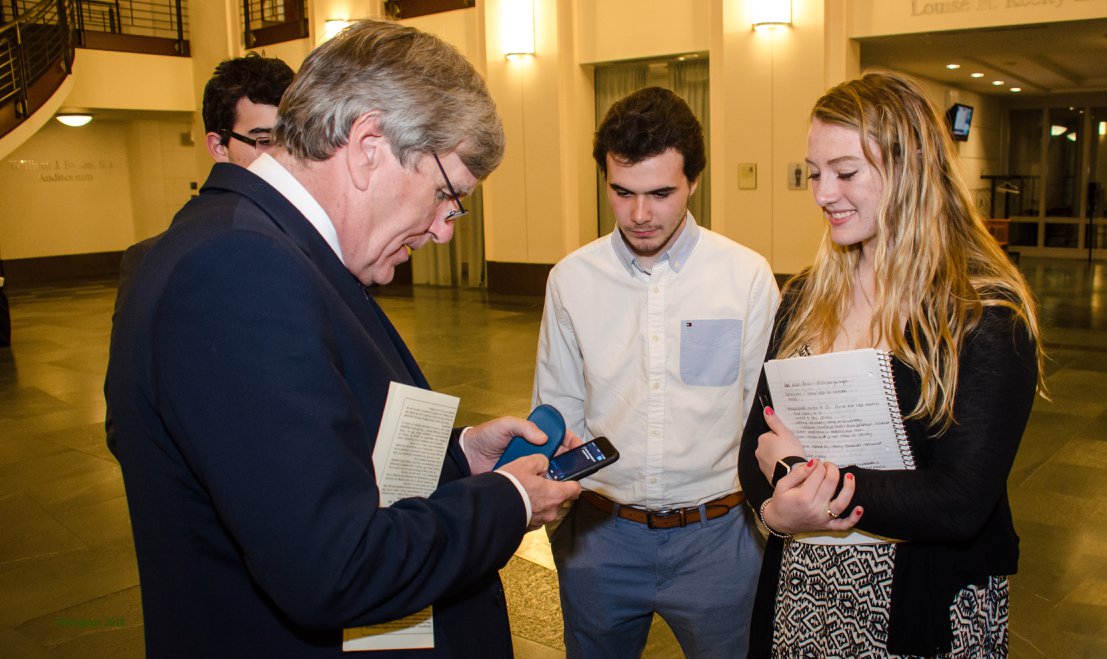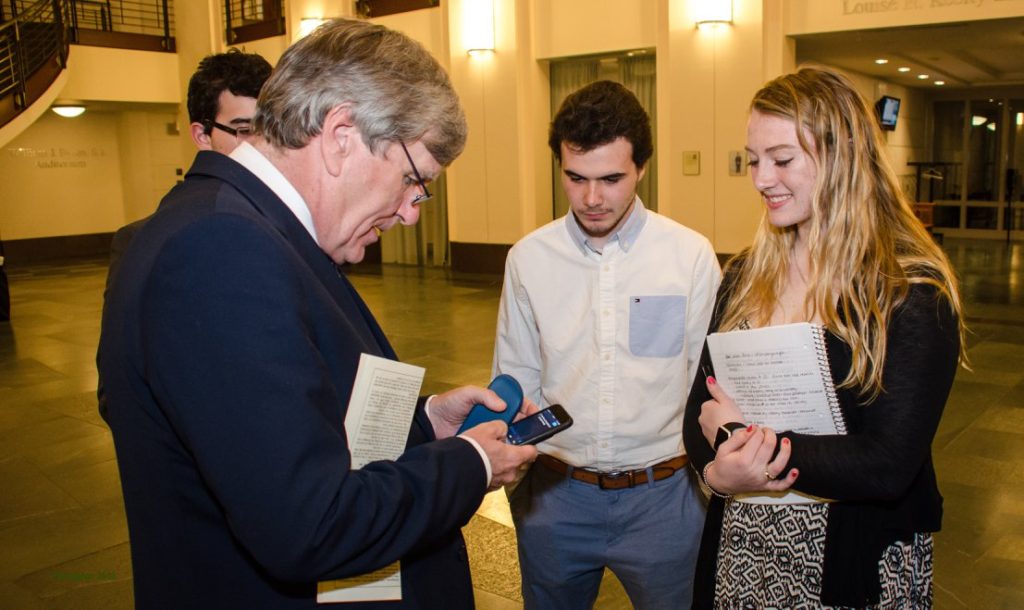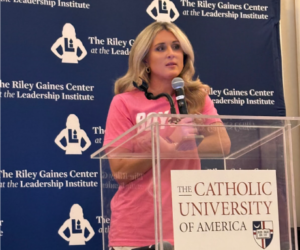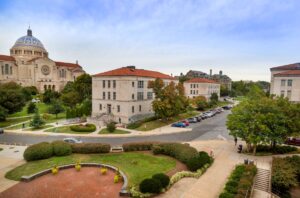Irish Ambassador to the United States Comes to Speak at Catholic

Ambassador Mulhall spoke with students studying Irish after the evening's conversation. Courtesy of Irish Network DC

By Abby Anderko ’21
On Wednesday, February 21st, the Irish Ambassador to the United States, Daniel Mulhall, spoke at Columbus School of Law at the Catholic University of America. Hosted in the Slowinski Courtroom, this conversation was moderated by Dean Daniel Attridge of the Columbus School of Law and was attended by approximately 100 students and members of the surrounding D.C. area in the audience.
Throughout his conversation, Mulhall touched on three distinct points about Irish politics today. The first was the “value of the European Union (EU) membership in Ireland” and how Ireland has been transformed through its membership. The second was the peace that was created in Northern Ireland thanks to the Good Friday Agreement and how the agreement needs to be preserved and used to guide negotiations. Finally, Mulhall spoke about his experience in America and the amazing strength and diversity of the Irish American community.
Ambassador Mulhall is Ireland’s 18th ambassador to the United States. Prior to his career in diplomacy, Mulhall graduated from the University College Cork, both undergraduate and graduate school where he specialized in modern Irish history. After school, Mulhall took a job at the Department of Foreign Affairs, introducing him to the field of diplomacy. His first diplomatic locations included New Delhi, Vienna, the EU in Brussels, and Edinburgh, where he was the first Irish Consul General. He has also held positions as the Irish Ambassador to Malaysia from 2001 to 2005, and Germany from 2009 to 2013. As a member of the Department of Foreign Affairs, Mulhall participated in the Irish delegation for the Good Friday Agreement which brought about peace to Northern Ireland.
Ireland has had a strong and difficult history in regard to relations with Great Britain, creating a lot of historical baggage between the two countries. Twenty-six counties in Ireland gained independence from Great Britain in 1922, dividing Ireland into two nations. Northern Ireland remained a part of Great Britain, and the Republic of Ireland was formed out of the freed counties. This freedom came after many bloody conflicts, one of the most notable being the Easter Rising, which occured seven years prior to Ireland’s independence in 1916.
Mulhall spoke about Irish investment in the EU. When Britain joined the EU in 1978, it forced Ireland to join as well because even though it was a free state, Ireland was still dependent on Britain. While it entered as one of the poorest states in Europe, today Ireland is now in the top three wealthiest countries in the EU. Joining the EU completely transformed Ireland as it was no longer dependent on Britain, but was able to branch out and create new relations with other countries in the Union. Due to Ireland’s investment in the EU, questions have been raised on how Brexit, or Britain’s choice to leave the EU, will affect not only the status of the trade among states in Europe, but also trade between Ireland and Northern Ireland.
Between 1973 and 1998, Ireland went through a period of extreme violence leading to a ceasefire in 1998. Peace in Northern Ireland has existed for 20 years now due to the lasting effect of the Good Friday Agreement. This agreement was a ceasefire for all violence in Northern Ireland; it implemented a soft border and allowed for trade and tourism to continue freely. With the impending departure of Britain from the EU, this has created conflict as to whether or not the Good Friday Agreement will be upheld. If Britain does leave the EU, this could create problems as it would mean that a hard border would need to be established separating Northern Ireland from the rest of the country, voiding the Good Friday Agreement. Neither the British nor Irish governments want to overturn the progress that has been made through the Good Friday Agreement, but negotiations must take place to figure a solution to this problem.
One major aspect of the political conflict that is plaguing Northern Ireland today is the debate of whether the Irish language should still be taught and implemented into Irish culture. The nationalist party believes that the language is a “litmus” test of culture. Mulhall, as an Irish speaker himself, is an advocate of the language and of students of the language here in the United States. After his presentation he addressed a group of four 102-level Irish students, wishing them much success in learning their language.
Since being in the United States, Mulhall spoke on how impressed he is with the diversity of American cities and how they are each independent and unique. He also commented on how within these cities there is a great strength in the Irish American community. He stated that no matter how long ago one’s relatives came to America from Ireland, whether it be in the 1800s or more recently, all people of Irish descent have a strong connection to Ireland, both its history and culture.
This event was put on by the Irish American Law Students Association in partnership with the Irish Network D.C. and the Catholic University of America Program in Irish Studies.







